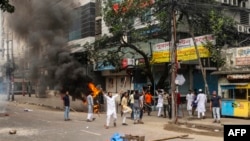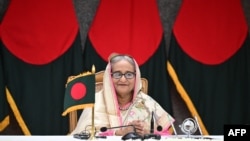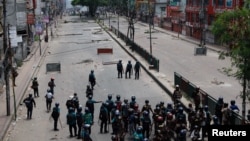Six months after a controversial election delivered a third consecutive victory to Prime Minister Sheikh Hasina, the government of Bangladesh is faced with the most serious outbreak of public unrest in a decade. The January elections were marred by an opposition boycott, but the challenge the government faces this month comes from university students with no apparent political affiliation.
The students have been protesting since the beginning of July, demanding an end to a quota system for government jobs that allocates 56% to applicants from special categories and the remaining 44% to general applicants. That, students say, discriminates against most applicants with the required qualifications.
The protests turned deadly Thursday as the students enforced a country-wide shutdown, triggering widespread clashes with police that have left at least 19 dead and scores wounded. The deaths follow violence on Tuesday when at least six people were killed.
Some media outlets put the death toll much higher.
Observers and media reports put the blame for much of the violence on the police and the Bangladesh Chhatra League or BCL, the student wing of Hasina’s ruling Awami League party.
The government is reeling from an economic crisis, with increasing costs of living hitting ordinary households hard, said political analyst Mushtuq Hussain.
Lingering public discontent over the elections, recent revelations of massive corruption in high places and on-going strikes by public university teachers over pension provisions have combined to make it a perfect storm for Hasina.
“The student movement has spread, and various groups seem to have become involved in this, which is turning into the most serious and widespread political challenge this government has faced,” Hussain told VOA in an interview.
Hussain, a former general secretary of the Dhaka University Central Students Union, said the government appears to have branded agitating students as their enemy and painted them in a political color. Hussain said the government has miscalculated badly, by thinking the students’ movement could be suppressed through violence.
“The government is already using violence against the protesters and if opposition political parties get involved in the violence, then the situation will spin out of everyone’s control,” Hussain warned.
The initial student protests over job quotas took place in 2018 when students urged the government to cancel the 30% reservations for the grandchildren of veterans of Bangladesh’s war of independence in 1971.
In the early years following independence, the quotas were reserved for war veterans themselves, then expanded to include their children in 1997 and grandchildren in 2010.
Students argued that was clearly discriminatory and needed to change.
Hasina initially resisted their demands, but then took everyone by surprise by scrapping the entire quota system – including the reservations for women, minorities and disabled people. There were protests from civil society groups who called for reform of the quotas, rather than outright cancellation, but the government remained unmoved, and the agitation died down.
Trouble reared its head again in June 2024, when a group of people, including relatives of war veterans, went to the High Court and challenged the government’s 2018 order to cancel the quotas. The court ruled that the government order was illegal and restored the quotas in their entirety.
The government appealed the High Court ruling, and several students took the matter to the Supreme Court. The quota case has now moved to the top court, where judges have urged students to wait for them to issue a ruling. But the agitation has continued, as student leaders fear that the whole court saga is a government ploy to have the quotas restored.
“We don’t want quotas, any type of quotas,” one of the leaders of the movement Mohiuddin Roni told VOA. “Minorities and other marginalized communities should come and join us, and we can discuss how to minimize the quotas.”
Quotas in government jobs are not new in Bangladesh – they have existed since the days of British colonial rule, to ensure fair representation of regions, women, ethnic minorities, etc. But young people are now forcefully questioning a system that they see as depriving them of opportunities.
“This young generation has become victims of jobless growth … the economy shows growth, but jobs are not created,” professor of economics Anu Muhammad wrote in the local Daily Star newspaper. “The total uncertainty in getting jobs … created frustration and anger among the students.”
Six years after the original movement, the student anger against the quota system appears to have remained as strong as before. Thousands have taken to the streets, setting up blockades, disrupting traffic in cities and on highways and battling both police and BCL activists.
To put a lid on the unrest, public universities around the country shut their campuses and ordered students residing in college dormitories to vacate the premises. Sensing the gravity of the situation, Hasina took to the airways and addressed the nation Wednesday.
She acknowledged the serious nature of the violence and promised a judicial inquiry into the killings. But she was noncommittal on the central issue of the unrest.
“I am urging everyone to be patient until the Supreme Court delivers its judgment on the issue. I am sure the student community will get justice from the highest court; they will not be disappointed,” Hasina said.
Hussain said Hasina appeared to have toned down her rhetoric, but she did not announce any step to reform the quota system, which is the core demand of the students. This was a missed opportunity, he said.
“This government is hugely experienced; it is a political government and knows how to defuse a situation. If it does not move quickly and the violence spreads further, then the country’s education system, democracy, everything will come under threat,” he said.
This story originated in VOA’s Bangla service.





